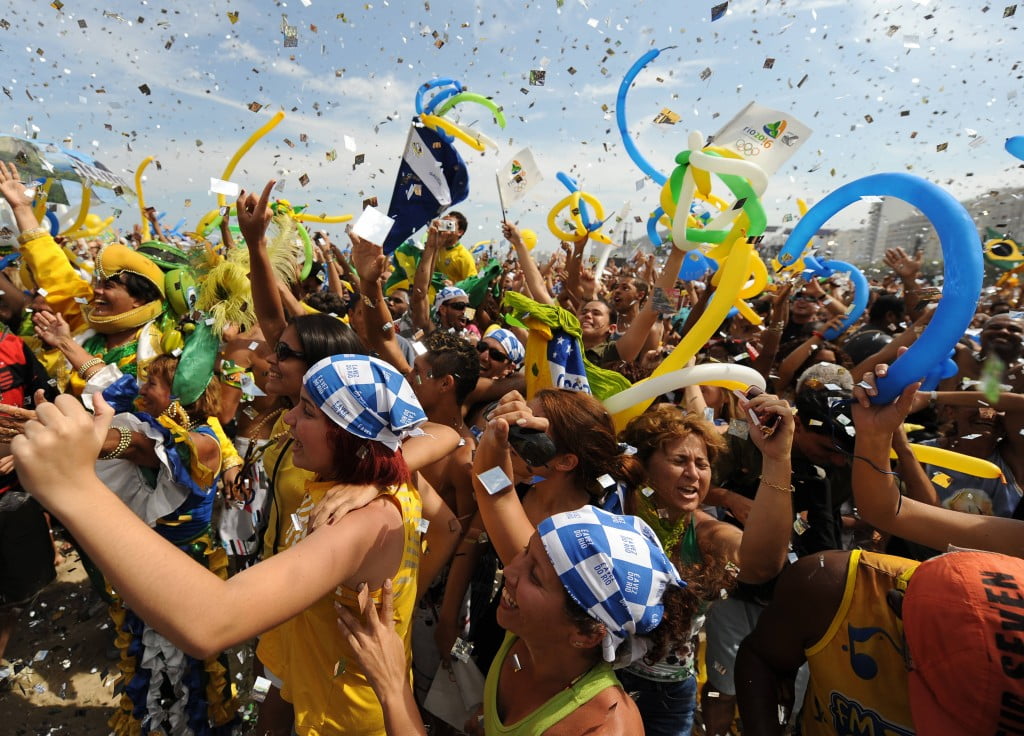The announcement took place in Copenhagen in October 2009: International Olympic Committee President Jacques Rogge opened the envelope and told the world that Rio de Janeiro had won its bid to host the 2016 Olympic Games.
Crowds watching a live broadcast on Rio’s famous Copacabana Beach exploded into a delirious uproar. Ticker tape swirled, a giant banner reading “Rio Loves You” was unfurled, and a samba club took to the stage.
The crowd cheers on Copacabana Beach in October 2009 after Rio was chosen to host the 2016 Olympics. (Vanderlei Almeida/AFP/Getty
In Copenhagen, then-President Luiz Inácio Lula da Silva declared: “This is the moment for Brazil.” TV Globo called it “a dream in an envelope.”
Brazilian President Luiz Inacio Lula da Silva cries at a contract signing ceremony in Copenhagen on Oct. 9, 2009, after Rio won its Olympic bid. (John Gichigi/Getty Images)
Seven years later, and less than a week before the games begin, many Brazilians are hoping that dream does not turn into a nightmare.
Brazil in 2016 is a more troubled country than the confident new global player Lula hoped to crown with Olympic glory. And Dilma Rousseff, the successor he chose, is suspended for an impeachment trial while the interim government formed by her former vice president, Michel Temer, struggles with a Zika epidemic and a recession.
In Rio, things are even worse. The state government is broke, and violent crime has risen. Promises to treat 80 percent of the sewage flushed into Guanabara Bay before Olympic sailing races take place there have been abandoned.
Two people died in April when part of a new elevated cycle path collapsed into the sea after a wave hit it. And Olympic delegations arriving at the Athletes’ Village complained about the state of the apartments — some even refused to stay there.
And local news outlets are reporting that neither Lula — the president who helped them win the Games — nor Dilma will attend the opening ceremony.
Here’s a look back at the many things that have gone wrong from Rio in the past year.

Trash floats on a polluted water channel that flows into Guanabara Bay in March 2015.
August 2015: The Goo Lagoon
Hundreds of thousands turn out across Brazil to demand the ouster of President Dilma Rousseff and an end to corruption. Prosecutors file corruption charges against Eduardo Cunha, speaker of the lower house in Brazil’s Congress. The U.S. rowing team doctor blames pollution when 13 rowers fall sick after a test event on the Rio lagoon.

Soccer player Neymar during a match in September 2015. (Jeff Zelevansky/Getty Images)
September 2015: A tainted star, and junk
Alleging tax evasion, a Brazilian court freezes $48 million in assets controlled by national soccer team star Neymar. Ratings agency Standard & Poor’s reduces Brazil’s investment grade to junk.

Indigenous people protest the approval of a proposed constitutional amendment in October 2015 that would put the demarcation of their lands into the hands of Congress. (Eraldo Peres/AP)
October 2015: Anger, and a missing Rousseff
Rio 2016 announces cuts because of Brazil’s deepening recession. A colorful World Indigenous Games took place in Palmas — but Rousseff was absent from a closing ceremony after being booed at the opening by protesters angry at a land demarcation proposal being pushed in Congress.

The Bento Rodrigues district is covered with mud after a dam owned by Vale SA and BHP Billiton burst in Mariana in November 2015. (Ricardo Moraes/Reuters)
November 2015: Deadly disaster
Delcidio do Amaral, a senator and leader of Rousseff’s government in the upper house, is arrested after recorded discussing how to subvert a corruption investigation. A mining dam near Mariana collapses, unleashing a torrent of mud and waste that kills 19 and poisons water supplies hundreds of miles away.
January 2016: Zika warnings widen
The CDC advises pregnant women to avoid traveling to Brazil and about a dozen countries in the Americas where Zika has been linked to brain damage in babies. The International Olympic Committee sends a memo outlining some of the planned precautions at the games.

A Carnival party in downtown Rio de Janeiro is held amid Zika worries on Feb. 4. (Lianne Milton/Panos Pictures for The Washington Post)
February 2016: And now, dengue
Zika worries hang over Brazil’s Carnival, with some revelers wearing mosquito costumes — but the revelries go ahead anyway. Brazil reports a dengue explosion — bad news for Zika, as it is transmitted by the same mosquito.

Demonstrators rally for Brazilian President Dilma Rousseff’s impeachment along Paulista Avenue in Sao Paulo on March 16. (Miguel Schincariol/AFP/Getty Images)
March 2016: WhatsApp standoff
Hundreds of thousands rally against corruption and call for Rousseff’s impeachment in protests across the country. A senior Facebook executive is arrested — and later released — after the company’s WhatsApp cellphone messenger service said it was unable to provide information for a police investigation.

Rousseff attends the opening ceremony of the National Policy Conference for Women in Brasilia on May 10. (Ueslei Marcelino/Reuters)
May 2016: The all-male cabinet
Rousseff is suspended but vows to fight back while controversy rages over the rowdy and chaotic lower house vote that decided her ouster – with many deputies facing corruption charges. Temer is immediately attacked for appointing an all-male cabinet.

Police officers and firemen welcome passengers with a banner reading “Welcome to Hell” as they protest against government delays in their pay at Tom Jobim International Airport in Rio de Janeiro on July 4. (Vanderlei Almeida/AFP/Getty Images)
June 2016: “Welcome to hell”
The state government of Rio de Janeiro declares a financial crisis that could cause a “total collapse in public security, health, education, transport and environmental management.” Police and firefighters protesting unpaid wages demonstrate at Rio airport with a banner reading: “Welcome to hell.”
July 2016: “Almost zero” Zika risk for visitors
Brazil’s health minister says visitors face “almost zero” risk of getting Zika during the Olympics as a small but growing number of athletes cancel their trips to Rio. Australian athletes arriving at the Olympic Village complain over electricity and plumbing failings and refuse to move in. Rio Mayor Eduardo Paes offers to install a kangaroo to make them feel at home.
Aug. 5, 2016: Let the games begin!
Opening Ceremony in Rio
[Source:- The Washington Post]





